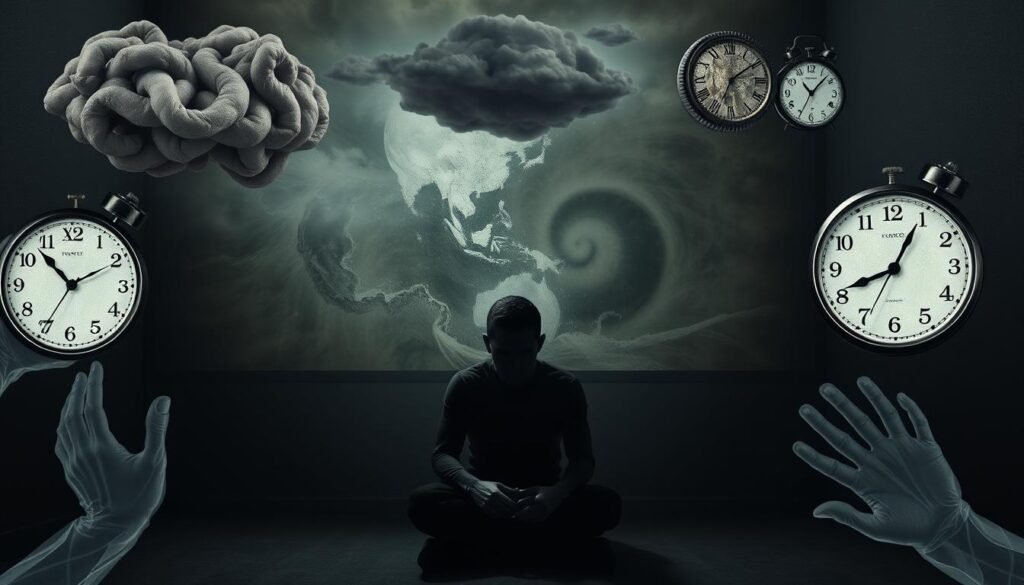Did you know almost a third of adults face an anxiety disorder at some time? This fact highlights how common anxiety is. It doesn’t just affect the mind; it also creates physical signs, including chest tightness. For many, feeling tightness in their chest is a clear signal of their inner struggles. It makes their daily life harder. Knowing how anxiety and its physical signs are linked helps people deal with anxiety better. It also shows when it’s time to seek help from a professional.
Key Takeaways
- 30% of adults experience an anxiety disorder in their lifetime.
- Chest pain and tightness are common symptoms of anxiety disorders.
- Panic attacks can lead to physical symptoms like excessive sweating and rapid heart rate.
- Recognizing anxiety symptoms is crucial for effective management.
- Cognitive Behavioral Therapy (CBT) can help in managing anxiety symptoms.
- Emergency visits for chest pain often lead to panic disorder diagnoses.
What is Anxiety?
Anxiety is a normal reaction to stress. It alerts us to possible dangers. When we sense danger, our body launches a fight-or-flight response. This increases our awareness and leads to physical changes. When anxiety becomes too intense, it can lead to an anxiety disorder. This can make daily tasks harder for the person affected.
About 30% of adults will deal with anxiety disorders at some time. Between 25 and 50 percent of people going to emergency rooms for chest pain feel moderate to severe anxiety. It’s important to know the difference between normal anxiety and an anxiety disorder. The latter involves ongoing worry and physical issues like chest tightness.
Those with anxiety disorders may show different anxiety symptoms. These symptoms can appear without warning. This unpredictability makes the disorder hard to recognize and understand, leading to more stress. Symptoms often include a faster heartbeat and tight muscles, which can cause chest pain.
Nearly half of people with chest pain learn they don’t have heart problems. In fact, 30 to 40% find out anxiety is the real cause of their pain. So, while anxiety is common, those facing it regularly should look for ways to manage and reduce it.
Understanding the Physical Symptoms of Anxiety
Anxiety affects both mind and body. Many people feel a range of physical symptoms. They often feel their heart beat faster, sweat more, and sense a strong fear. Symptoms like shortness of breath and chest pain due to anxiety are common. These make dealing with anxiety harder for those affected.
About 58% of chest pain during anxiety isn’t related to heart problems. It’s just a part of anxiety. Chest pain can feel sharp or stabbing. It might last for hours or days after the anxiety attack. Knowing how long and what kind of chest pain you have is important. Anxiety-related chest pain usually goes away in minutes to an hour. This is different from heart-related chest pain, which lasts longer.
Rapid breathing or hyperventilation happens during anxiety episodes. This makes the muscles around the ribs stressed, causing discomfort. Studies show 30-40% of people with panic disorders feel chest pain too. Anxiety causes adrenaline to spike, increasing heart rate and blood pressure quickly.
Many people with anxiety also feel stomach upset. Up to 70% report bloating and heartburn. It’s key to know these are anxiety symptoms, not something more serious. But, atypical symptoms can make diagnosing hard, especially in certain people.
Managing anxiety with cognitive behavioral therapy (CBT) can be effective. It helps reduce symptoms by 60% to 75%. Knowing about these symptoms can lead people to get the right help. This can greatly improve their lives.
Chest Tightness Anxiety: A Common Symptom
Chest tightness from anxiety is common for many. It can feel like sharp pain, an ache, or muscle tension. For some, it feels like the chest is being squeezed. Others might have discomfort in one spot.
Since chest tightness varies, it can cause more anxiety or panic. Studies show 25-50% of chest pain visits to emergency rooms are due to anxiety, not heart problems. This fear of heart attacks can deeply scare people, especially when panic hits suddenly without warning.
Typically, chest pain from anxiety lasts about 10 minutes. But this time can be different for each person. The good news is, the pain doesn’t last long. However, its unpredictability can still be scary. Stress makes our muscles tight, which can make the chest feel worse.
Chest tightness affects both mind and body. To improve, try stress management like mindfulness, deep breathing, and exercise. These activities ease muscle tension and help cope with anxiety.
Understanding the link between chest tightness and anxiety is key. Knowing it’s a common experience can help lessen the worry.
How Anxiety Causes Chest Pain
Anxiety causes changes in our bodies that lead to chest pain. It starts with the body’s fight-or-flight response. The body releases substances like adrenaline and cortisol. These make the heart beat faster and blood pressure rise. Muscles, especially in the chest, tighten up because of these.
When someone has anxiety for a long time, these effects keep going. It leads to constant tension and pain in the chest. Chest pain is especially common in those with panic disorder. About 25% of people who see a doctor for chest pain have panic disorder. And in emergency rooms, 18% to 25% of chest pain cases are due to panic disorder.
The connection between anxiety and chest pain is clear. Between 22% and over 70% of people have chest pain during a panic attack. This often results in expensive tests to check the heart. Anxiety can also bring on lasting problems for the heart. Conditions like stress cardiomyopathy look like heart attack symptoms.
Knowing how anxiety leads to chest pain points out the need to treat anxiety disorders fully. Using treatments like cognitive behavioral therapy helps reduce these symptoms. It also helps people feel better overall.
Chest Pain Anxiety vs. Heart Attack: Key Differences
It’s vital to know how anxiety-related chest pain and heart attack symptoms differ. This knowledge helps get the right treatment fast. While they might feel similar, their causes are not the same.
Chest pain due to anxiety feels sharp or shoots in the chest center. This pain usually gets better in minutes. It often comes with feeling out of breath or a fast heartbeat. Panic attacks, lasting a few minutes to an hour, often bring on this pain. Emotional stress is a trigger in 60-70% of these cases.
Heart attack symptoms, on the other hand, include a pressing or squeezing feeling. This happens mainly on the chest’s left side or under the sternum. The pain tends to stick around or change intensity. Women, particularly, might also feel short of breath, jaw pain, and sick to their stomach.
Let’s break down these differences:
| Symptoms | Anxiety Chest Pain | Heart Attack Symptoms |
|---|---|---|
| Nature of Pain | Sharp or shooting | Pressure or squeezing |
| Duration | Resolves in minutes | May persist with varying intensity |
| Associated Symptoms | Shortness of breath, racing heart | Nausea, jaw pain, dizziness |
| Common Triggers | Emotional stress | Physical exertion |
Identifying Anxiety Symptoms Beyond Chest Pain
Anxiety disorders have a wide range of anxiety symptoms beyond just chest pain. These include enduring worry, restlessness, and intrusive thoughts. There are physical anxiety manifestations as well, like shaking, heavy sweating, digestion issues, and muscle tightness.
About 25 to 50 percent of people who visit emergency departments for chest pain actually suffer from anxiety. This can confuse doctors, as these symptoms may seem like heart problems. Interestingly, 30 percent of heart attack patients don’t feel chest pain, which shows anxiety can hide or look like other serious issues.
It’s vital to understand anxiety’s different aspects to recognize and treat it:
- Constant worry can lead to tight muscles, which cause chest discomfort.
- Anxiety’s stress response can make you breathe faster and your heart race.
- Knowing panic attack symptoms helps people get help quicker.
About 30% of adults will face an anxiety disorder at some point. For example, Generalized Anxiety Disorder affects almost 3% of adults each year.

| Anxiety Disorder | Prevalence (%) |
|---|---|
| Generalized Anxiety Disorder | 2.9 |
| Panic Disorder | 2.7 |
| Social Anxiety Disorder | 7.1 |
| Specific Phobia | 12.5 |
| Agoraphobia | 1.3 |
Knowing anxiety symptoms helps us understand our mental health better. It prompts us to seek help. Realizing the link between mental and physical symptoms is crucial for addressing anxiety disorders fully.
What Causes Anxiety Chest Pain?
Chest pain caused by anxiety comes from various factors. These are mainly the body’s physiological reactions to anxiety. When we feel anxious, our body responds by releasing stress hormones like adrenaline and cortisol. This leads to a faster heart rate and blood pressure changes, often felt as chest discomfort. Around 30% to 40% of people rush to the emergency room for chest pain that’s not a heart risk but due to causes of anxiety chest pain, making it hard to diagnose.
Muscle spasms in the chest area can also lead to pain feelings. These spasms might happen in the chest or esophagus. They can feel sharp or very tight. About 60% of those with anxiety say their chest pain feels like tightness or pressure. This pain can suddenly hit, lasting about 10 minutes. This is different from heart attack symptoms, which slowly start during physical activity.
The way anxiety feels can greatly vary from person to person. Some might feel a constant ache, while others experience sharp pains. As the body keeps reacting to anxiety, this can create a cycle. Physical symptoms make anxiety worse, which makes us focus more on these feelings.
| Symptom Type | Anxiety Chest Pain | Heart Attack |
|---|---|---|
| Nature of Pain | Sharp or localized | Pressure or squeezing |
| Duration | About 10 minutes | Gradually increases |
| Trigger | Specific stressors | Physical activity |
| Radiation of Pain | Localized | Can radiate to arm or shoulder |
| Prevalence | Affects approximately 70% of those with anxiety | Common across various demographics |
Knowing the causes of anxiety chest pain helps people feel better when it happens. It also raises awareness about how anxiety affects us physically. Managing anxiety well can lessen the pain from muscle spasms. It helps improve our overall health too.
Recognizing the Signs of Panic Attacks
Panic attacks are a severe form of fear, where sudden overwhelming anxiety hits. It’s key to recognize the signs to connect them to anxiety disorders. These attacks can come without warning and show several physical signs.
Some people may have panic attacks a few times yearly, or even weekly. This greatly affects their life. Panic attack symptoms usually last from 10 to 20 minutes. They include heart palpitations, shortness of breath, and feelings like chest pain but without severe tightness or neck/arm pain. Knowing how to tell panic attacks apart from heart attacks is vital.
Women are more likely to have panic disorder, often starting in early adulthood. They might also feel nausea or light-headedness. While panic attacks are sudden and fierce, anxiety attacks build up over time, triggered by stress or fear. Anxiety attack symptoms grow slowly.

| Panic Attack Symptoms | Duration | Comparison with Anxiety Attack Symptoms |
|---|---|---|
| Heart palpitations | 10-20 minutes | Abrupt onset, intense |
| Shortness of breath | Can resolve quickly | Gradual increase in intensity |
| Dizziness or lightheadedness | Typically less than 10 minutes | Accompanied by specific stressors |
| Trembling or shaking | Symptoms may persist longer | Often lasts days or weeks |
| Extreme fear or sense of impending doom | Varies greatly | Triggered by particular threats |
Understanding panic attacks and their signs helps in distinguishing them from other conditions. People who’ve had panic attacks before are more likely to have more. This shows why recognizing them early and knowing treatment options is important.
Home Remedies for Managing Anxiety Symptoms
Over 19% of adults in the United States suffer from anxiety each year. They face symptoms like nervousness, tension, and chest pain. Luckily, many home remedies for anxiety can offer relief. One effective method is deep breathing exercises, which can be done daily. They provide instant calm when anxiety hits. These exercises help people relax by reducing anxiety symptoms significantly, especially in those with panic disorders.
Another helpful approach is to exercise regularly. This has been tied to lowering anxiety symptoms by about 20%. Just moving your body can help manage anxiety and improve your overall health.
Writing about your feelings is another great home remedy. A 2018 study found it eases mental distress, improving well-being. Also, using relaxation apps daily can encourage mindfulness. This aligns with techniques known to lessen anxiety.
Natural remedies also show promise, such as essential oils like lavender and chamomile. Aromatherapy with lavender can reduce anxiety symptoms by 30%. Meanwhile, taking chamomile might cut symptoms of generalized anxiety disorder by half within eight weeks. These natural methods could boost the effects of other strategies.
Besides these methods, living a healthy lifestyle is crucial. This means eating well and sleeping enough. These habits lay a firm foundation for controlling anxiety symptoms. Adopting these remedies offers a broad strategy that helps people find what works best for them.
| Home Remedy | Benefits |
|---|---|
| Deep Breathing Techniques | Reduces anxiety symptoms by up to 50% |
| Regular Exercise | May decrease anxiety symptoms by 20% |
| Emotion-Based Journaling | Reduces mental distress and boosts well-being |
| Aromatherapy (Lavender, Chamomile) | May lead to a 30-50% reduction in anxiety symptoms |
| Healthy Lifestyle Habits | Provides a solid foundation for managing anxiety |
When to Seek Emergency Care for Chest Tightness
Knowing when to seek help for chest tightness is key. Chest pain shows up in many ways. It can be dull or sharp, weak or intense. It’s crucial to know when these symptoms might be serious.
Every year, about 7.6 million Americans go to emergency rooms for chest pain. If you have chest pain, watch for heart attack warning signs like:
- Difficulty breathing
- Excessive sweating
- Nausea
- Pain spreading to the jaw, neck, back, or left arm
These signs often mean you need medical attention for chest tightness quickly. Emergency rooms are open all the time. They check patients fast which can help a lot with treatment.
Chest pain that comes on strong or doesn’t go away needs fast action. Sudden, severe pain happens in about 40% of heart attacks. Don’t ignore feelings like lightheadedness, dizziness, or trouble breathing. They might mean you need urgent help.
About 20% of emergency room visits for chest pain aren’t heart-related. Things like anxiety, heartburn, or acid reflux can cause pain that feels similar. But, if you feel chest tightness, it’s better to be safe and seek help.
The table below shows how anxiety-related chest pain differs from more serious issues:
| Symptom | Anxiety-Related Chest Pain | Heart Attack |
|---|---|---|
| Duration | Usually lasts about 10 minutes | Goes on longer; starts suddenly |
| Pain Location | Stays in one spot, may feel tight | Spreads to arm, jaw, or back |
| Accompanying Symptoms | Other signs of anxiety (dizziness, sweating) | Can’t breathe well, nausea, feeling faint |
| Need for Care | May not need to rush to get help | Needs quick care |

In short, while anxiety can cause chest pain, spotting serious heart symptoms is key. When in doubt about chest pain, always choose to get help. It’s better to be cautious.
How Anxiety Disorders Affect Physical Health
Anxiety isn’t just about feeling stressed; it can harm your body too. In the U.S., around 6.8 million adults battle with Generalized Anxiety Disorder (GAD) each year. They are more likely to face heart problems and other illnesses.
When you’re always anxious, your body can react. You might see issues like high blood pressure and heart disease. Some people with anxiety also deal with stomach problems like Irritable Bowel Syndrome (IBS).
Being anxious all the time can raise cortisol levels, making you gain weight. This can make existing health problems worse. Anxiety can cause your heart to beat faster too. This increases the risk of heart issues, especially if you already have health problems.
Anxiety also affects your immune system. This makes getting sick easier. Research shows it can even make vaccines less effective for you. Plus, if you have conditions like COPD or asthma, anxiety might make them feel worse.
It’s crucial to deal with anxiety because it affects your body too. Understanding how your mind and body are linked is the first step. Getting help early can ease stress and keep you healthier.
Conclusion
It’s crucial to understand anxiety and how it relates to chest tightness. Studies show 30% to 50% of chest pains not related to the heart are caused by anxiety. Knowing the difference between anxiety discomfort and heart issues is important. It helps when you’re seeking help from a doctor. Understanding symptoms can reduce fear and help you handle chest tightness better.
Many who have anxiety also experience sharp chest pains. Relief can come from deep breaths, exercise, and a good diet. It’s interesting that most people with panic attacks feel chest tightness. So, improving your lifestyle, like better sleep and less caffeine, helps manage anxiety.
Knowing anxiety signs helps with your overall health. If symptoms keep up, talking to a therapist or doctor might be good. Combining self-care with professional advice can make dealing with anxiety easier. This improves your life significantly.